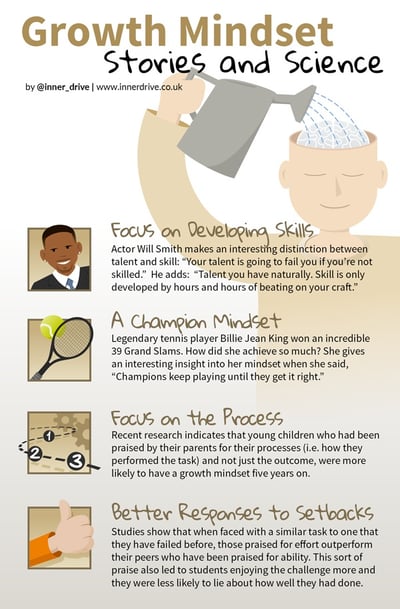STORY #1: WILL SMITH
Will Smith is one of the most recognised actors and musicians in the world and is the only actor to have 11 consecutive films gross over $150 million internationally.
Although, at the beginning of his career, following brief success in the music industry, he encountered financial difficulties and was thrown a lifeline with his own TV show The Fresh Prince of Bel Air, which became a huge success.
Will separates himself from his peers through his work ethic. He also shows his growth mindset with his views on the difference between talent and skill: “Your talent is going to fail you if you’re not skilled.” He adds: “Talent you have naturally, skill is only developed by hours and hours of beating on your craft."
STORY #2: BILLIE JEAN KING
 Legendary tennis player Billie Jean King won an incredible 39 Grand Slams. How did she achieve so much? She says in her book that "Pressure is a privilege", and that “Champions keep playing until they get it right.”
Legendary tennis player Billie Jean King won an incredible 39 Grand Slams. How did she achieve so much? She says in her book that "Pressure is a privilege", and that “Champions keep playing until they get it right.”
SCIENCE #1 FOCUS ON THE PROCESS
How important are the early interactions between a parent and their child? What can parents do to best help their child develop a positive learning mindset later on in life? To answer these questions, researchers from the University of Chicago and Stanford University ran a fascinating study over a number of years.
They found that parents who praise their child for their processes (i.e. how they performed the task) rather than for their outcome (the result), were more likely to have a growth mindset 5 years later.
This type of praise will encourage a child to believe that ability is something that can change, that success is down to hard work, and that challenges are enjoyable. Click here to find out more about the impact of different types of parental praise.
SCIENCE #2 BETTER RESPONSES TO SETBACKS
Research suggests that when students are faced with a task that they have failed before, those praised for their effort outperform their peers who had been praised for their ability. Praising for effort also led students to enjoy the challenge more and they were more likely to persist with a task.
This studies indicates that well-intentioned praise of intelligence does not prepare students for coping setbacks; in fact it actually has negative effects on the students motivation when faced with later challenges.
If you haven't read parts 1-5 of this series, why not check out Growth Mindset: Stories & Science - Part 1. Or you can visit our page on How to Develop a Growth Mindset which has tons of great tips and links to the latest research on Growth Mindset.






